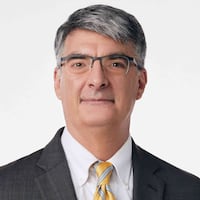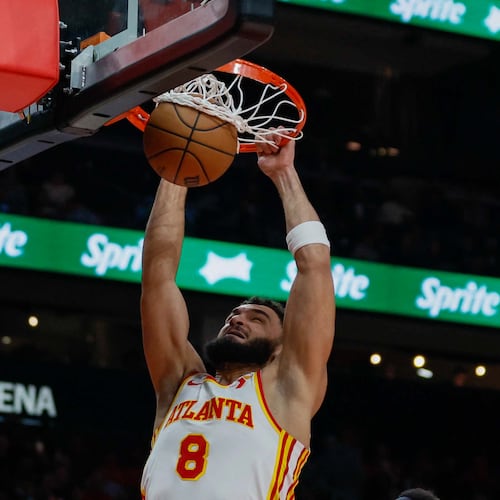Basketball didn’t get in the way of Dikembe Mutombo’s dream.
Rather, the sport gave him a chance to exceed his wildest imagination.
Mutombo arrived at Georgetown University from the Democratic Republic of the Congo in 1988 on an academic scholarship from the United States. The plan was to become a medical doctor and return home for a career of helping others.
However, a person standing seven feet, two inches tall has a way of standing out on a campus with a high-profile basketball program. At the urging of many, Mutombo met with coach John Thompson.
The rest is history.
Following his collegiate playing days, Mutombo spent 18 seasons in the NBA, including four-plus with the Hawks. He was an eight-time All-Star and a four-time Defensive Player of the Year. He ranks second all-time in NBA history in blocked shots. Following the end of his playing career in 2009, Mutombo was elected to the Naismith Memorial Basketball Hall of Fame this year. He received his Hall of Fame jacket Thursday and will be formally inducted with the greats of the game Friday.
Mutombo’s on-court accomplishments were many. Through all those basketball seasons and to this day, his off-court humanitarian efforts have made bigger achievements. None were bigger than the opening of the Biamba Marie Mutombo Hospital, named for his mother, in the Congolese capital of Kinshasa. Mutombo donated much of the money himself.
“I wouldn’t have had the impact that I’m having today if I didn’t play the game,” Mutombo said of the decision to play basketball. “How many doctors do you know who have gone out and built a hospital? I’m treating more people than any doctor could have in his lifetime. I’m providing medicine. I’m providing diagnosis. I’m providing surgery. I’m providing an education center. I’m bringing a lot of tools to the table.
“Sometimes I sit down and say, ‘How did this dream come to my life and become a reality?’ Each one of us go off to sleep and we dream about something, but not so many of our dreams go on to become reality. I think I was just lucky to follow the vision that God gave to me. It turned out to be a great vision.”
Mutombo will be inducted with Dick Bavetta, John Calipari, Louie Dampier, Lindsay Gaze, Spencer Haywood, Tom Heinsohn, John Isaacs, Lisa Leslie, George Ravling and Jo Jo White.
Wearing his newly fashioned blue blazer with the Hall of Fame logo emblazoned on the chest, Mutombo reflected on the impact of his career. He said “fear” was the determinant to play basketball upon the meeting with Thompson, himself a member of the Hall of Fame who will present Mutombo along with former NBA Commissioner David Stern.
“Coach Thompson just brings a presence,” Mutombo said. “When you see him you say, ‘Oh (expletive).’ Excuse my French, but his presence brings so much.”
Mutombo can laugh now about his career path after the Nuggets drafted him fourth overall in 1991. He needed to work out some details with the U.S. government about that commitment he made when he accepted the USAID scholarship. His first training camp was delayed.
Mutombo thinks that he, the United States and many around the world benefited from his basketball career. His high profile has led to so many being helped by the Dikembe Mutombo Foundation, his work as an NBA Global Ambassador and his other humanitarian efforts.
“I know the people with the USAID are so happy with the promise I made that while I was not going back home at the beginning, today I have gone back home and did something much bigger,” Mutombo said.
During his playing days, his teammates were well aware of just how far Mutombo had come — literally — and all the good work he was intent on doing. Several of his former Hawks teammates said Mutombo would talk world events and politics in the locker room, wanting them to know that so much needed to be done around the world.
“Who he is as a person hasn’t changed,” former Hawk Steve Smith said. “I always tell people, it’s a cliché, he is easy a Hall of Famer from his character and what he does for others. That will be one thing that always supercedes his skill and career he had.”
About the Author
Keep Reading
The Latest
Featured

